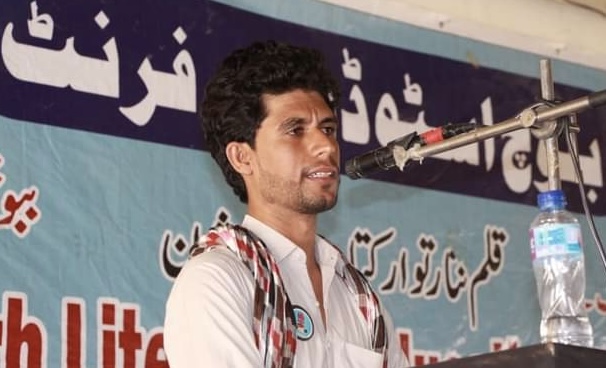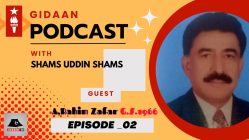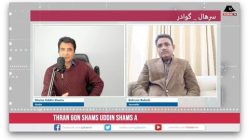The law is a set of rules and regulations created and enforced to protect the rights and freedoms of all citizens. Similarly, the constitution is considered the rulebook of a country or nation. Under the constitution and the law, citizens are granted their fundamental rights globally.
Moreover, Islamic Shariah upholds justice and equality for all humans, regardless of background, color, culture, or language. So why does the country—sorry, the so-called country—Pakistan, which claims to be an Islamic state, fail to implement laws based on Islamic Shariah? Does Islam advocate torturing students and political activists? Has Islam ever permitted the forced abduction of Balochs?
The fascist state of Pakistan has consistently used Islam negatively. Can a nation that has failed to remain stable despite drafting multiple constitutions truly be considered a good nation?
Let us not talk about previous constitutions—let’s focus on the current constitution of 1973.
The written Constitution of 1973 of Pakistan contains 280 Articles, among which Article 8 to 28, pertain to the rights and freedoms of citizens.
ARTICLE 9:
Article 9 of the Constitution guarantees the right to life, security, and protection of the person. It states that no one shall be deprived of life or liberty in accordance with the law. It grants the right to live with complete freedom and independence. However, this law is not implemented or enforced for the people of Balochistan—the Baloch—who, every single day, receive the dead bodies of their loved ones. These are people who were forcibly disappeared and then killed in fake encounters.
ARTICLE 14:
Furthermore, Article 14 guarantees the inviolability and protection of human dignity and the privacy of the home. But in the suppressed region of Balochistan, security personnel—the beasts in uniform—violate the sanctity of homes. They dishonor the privacy and sanctity of homes, subject women to violence, and just like Baloch youth, they are also dragged, taken into custody, and transferred to unknown locations.
ARTICLE 16:
Article 16 grants the freedom of movement and assembly. It ensures that citizens have the right to hold peaceful protests and gatherings for justice and rights. But what about this so-called nation? Is it even acting upon its own constitution? When the Baloch people—who are suffering and enduring state-led tragedies—hold protests and demonstrations, they are met with baton charges, tear gas, water cannons, and even live bullets. Innocent Baloch lose their lives. Whenever the government hears of a peaceful demonstration, it imposes Section 144, under which no group of more than five individuals is allowed to assemble. How cruel is the state.
ARTICLE 19:
If we consider Article 19, which guarantees freedom of speech and expression—every individual in the state has the right to express their opinions. But disappointingly, if someone picks up a mike and tries to share the agony and catastrophe inflicted upon them by the state, they are thrown into dark torture cells. Anyone who raises objections against unjust policies and laws is detained or charged with high treason.
ARTICLE 25 and 25A:
Article 25 of the Constitution grants equal protection to all citizens under the law, regardless of their background, social status, culture, or heritage.But I must also say that Article 25(A), which ensures the right to education, is not enforced in Balochistan either. In exchange for education and scholarships, the state gives the Baloch people the bloody corpses of their sons and brothers—returned to helpless mothers and crying sisters. And those who manage to get an education with great hardship and come close to achieving their goals are forcibly disappeared for years, or their mutilated bodies are dumped in deserted and forested areas.
Truly, an intellectual has unveiled the reality in these words: “A law that exists only on paper is no law at all; it becomes a tool for oppression rather than a shield for the oppressed.”
Indeed, a constitution under which people are not held accountable becomes a sharp weapon in the hands of oppressors against the oppressed.
Even law students—those who are likely to uphold and abide by the law more than many other citizens in the future—are not protected. They are denied the very security and legal protection promised by the Constitution. Instead, they are subjected to torture and enforced disappearances, often during the night.
FORCED ABDUCTION OF CHAIRMAN JAVID BALOCH:
Chairman Javid Baloch, a committed law student and a peaceful, dedicated political activist, is a sincere leader and the chairman of the Baloch Students Front. He hails from the small village of Malar Kolwah in Awaran, Balochistan.
In his teenage years, Chairman Javid Baloch left behind his home, parents, siblings, and entire family in pursuit of higher and better education. For the sake of his studies, he lived a life of displacement—sometimes in Quetta, other times in Karachi.
A firm believer in democracy and peaceful struggle, he would often say: “Never be reactionary. Struggle peacefully and raise your voice for your rights and justice. Otherwise, violations only lead to curses and destruction.”
He chose the field of law to spread justice and equality. He believed: “Law is not only a profession, but a hope for justice.”
Unfortunately, the very person who aspired to uphold justice has himself been denied it. In the early hours of April 23, 2025, at 3:00 AM, dark clouds loomed over Chairman Javid Baloch as he fell victim to the state’s barbaric and cruel policies. He was illegally abducted without any legal procedure, shackled in chains, and thrown into dark, torturous cells.
I remember once Chairman Javid Baloch was sharing his heart-wrenching story. He said, “It was in 2017 or 2018 when my father passed away, leaving us to suffer in the harsh heat of life.” (He mentioned the exact year, but I can’t recall it now.)
At that time, he was in Quetta, while his father had been shifted to Karachi from their underdeveloped village in District Awaran. One day, he received an urgent call from his brother, asking him to come to Awaran as soon as possible. He tried his best to reach there, but on the way, he received the devastating news that his father had passed away and was already being taken back to Awaran for burial.
Unfortunately, he faced protests on the road and couldn’t make it in time for the funeral. With tears in his eyes, he said:
“This unfortunate son didn’t even get the chance to see his respected father one last time.”
The reason he was far from his family was his pursuit of education.
I, being his political student, asked many questions and always received polite, law-based answers. He would often ask me, “Mehrnaz, do you know what the Constitution of Pakistan says? What are amendments, sections, ordinances—even the MPO (Maintenance of Public Order)?” He used to say, “No matter how much you are suppressed or what oppression you face in this state, you must know the law and the Constitution. Do not be too rigid.”
Muhammad Masood Khalid, in his book “Sanjh,” speaks the truth: “The law is like a spider’s web—an influential man can easily tear through its threads and walk away, while for a poor man, those same th
reads are stronger than iron chains.”
We still continue to demand the safe release of Chairman Javid Baloch within the framework of the law and the Constitution. If he has committed any wrongdoing, there are courts and legal systems established for that purpose. He must be presented before a court, and every procedure must be carried out in accordance with the law.








Add comment